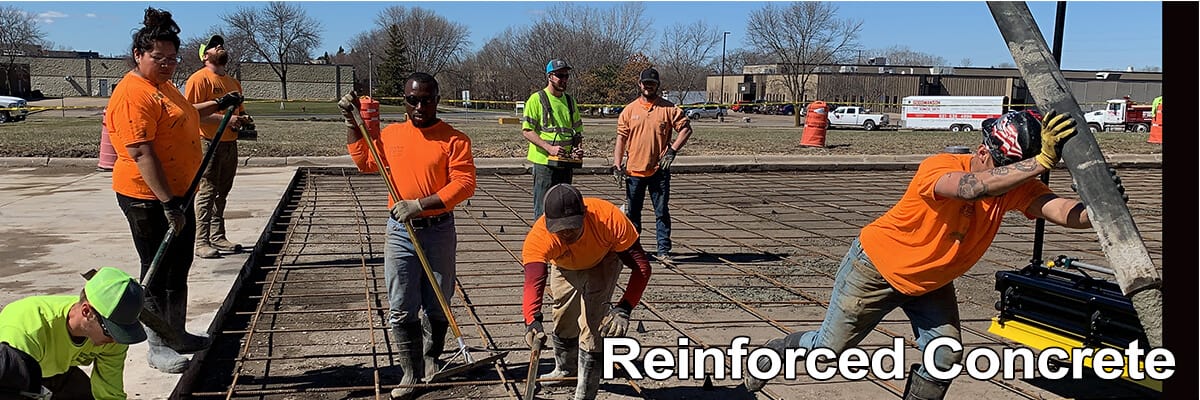Using Rebar and Fibers to Reinforce Commercial Concrete
When it comes to concrete in the Twin Cities, sometimes it’s just not strong enough on its own.

When you add Minnesota weather to any mix, the freezing and frost heaving, you can get unpredictable results. Or entirely predictable results depending on how much experience you have with concrete work.
Goodmanson Construction has over 46 years of experience working with concrete in Minnesota. We have learned some things along the way. One of those things was about insulation, which we already talked a little bit about. But another thing that people have been asking us about is “how do you reinforce concrete?” or “why reinforce concrete?”
For commercial concrete construction or industrial concrete construction, reinforcement is an essential consideration. You’ve got a concrete parking lot or a loading dock that needs to be able to stand up to semi truck traffic. You’ve got a machine foundation that needs to be able to stand up to persistent vibration. So you need to think about going a step further with your concrete than just pouring a slab and hoping for the best.
Rebar Reinforced Concrete
Steel reinforcement with rebar (short for steel reinforcing bar, in case you’re curious) is a common technique for creating reinforced concrete. This provides some resistance to the tensile (surface pressure) forces acting on your concrete. It’s a simple concept. You have steel bars woven into a pattern and embedded into the concrete.
Rebar is easy to find, too. Most contractors have access to it and have the knowledge necessary to use it for concrete structural reinforcment. But you’ll still want to ask about it if your Project Designer doesn’t bring it up.
The only real drawback to steel rebar is that eventually the rebar is going to rust and lose its ability to hold the concrete together. This process takes years, and most likely it will be decades before you’re thinking of having your parking lot redone anyway.
But Goodmanson Construction also likes to be at the cutting edge of commercial and industrial concrete. So let’s get into another option: Fiber Reinforced Concrete.
Fiber Reinforced Concrete
Fiber reinforced concrete is a construction material that is a combination of something old and something new all at once. Fiber has been used in concrete ever since ancient times where animal hair was mixed in with the concrete in order to increase the structural durability. We’ve come a long way since then and fibers are now made of sturdier and less degradable material.
The concept is a simple one: adding in fibers with your concrete mix (this can be tricky, so you want to be sure you’re working with a supplier who can consistently do this mixing well). The fibers hold the concrete together against the pressures and tensile stresses acting upon it. Whether it’s trucks running it over, or it’s frost pushing up from underneath. The fibers bind the concrete together and result in less cracking, increased tensile strength and compressive strength and better structural integrity over time.
Can you use both rebar and fiber reinforced concrete?
Absolutely! There’s nothing stoping you. For cost saving purposes, you might want to choose one over the other (and for some projects like foundations, rebar still is the name of the game) but you could also choose both. This would be something you’d want for a commercial concrete project or industrial concrete project where durability over time is paramount. So you’ll be able to justify the cost by the concrete holding together better for longer.
Performance is key!
If your business involves heavy traffic, big trucks and a lot of use, reinforcement is something you’re thinking about already. Now you have even more options to keep your business going. If you’re talking about a residential project, primarily people focus on aesthetics. How does the concrete look over time?
For commercial and especially for industrial concrete, it’s about performance. A concrete loading zone that is full of potholes isn’t going to perform as well for you as one that holds together. Do you want your vehicles driving over potholes over and over again? Probably not!
Can you combine this with insulated concrete? Of course. Polystyrene insulation works just fine with rebar and fiber reinforced concrete. This gives you a triple whammy of protection. First, the insulation is going to help prevent frost heaving. Second, the rebar is going to hold the concrete together against force from up above and the fibers will help prevent the surfaces from succumbing to forces from underneath.
With rebar and synthetic fiber in the concrete (and while you’re at it, some polystyrene insulation too) you’ll give your business a fighting chance against both Mother Nature and Father Time.

